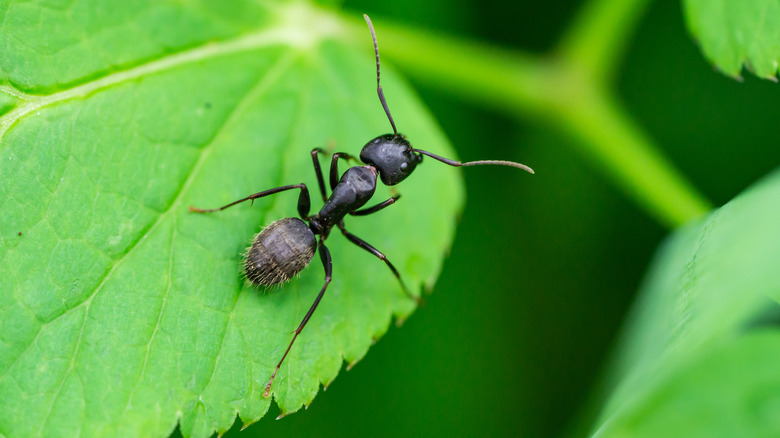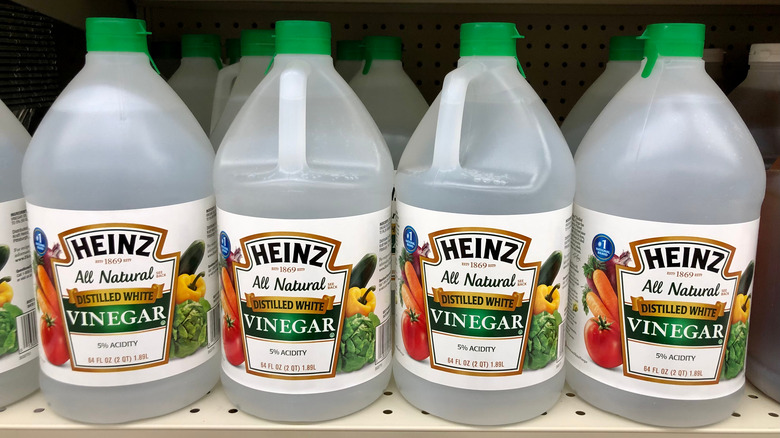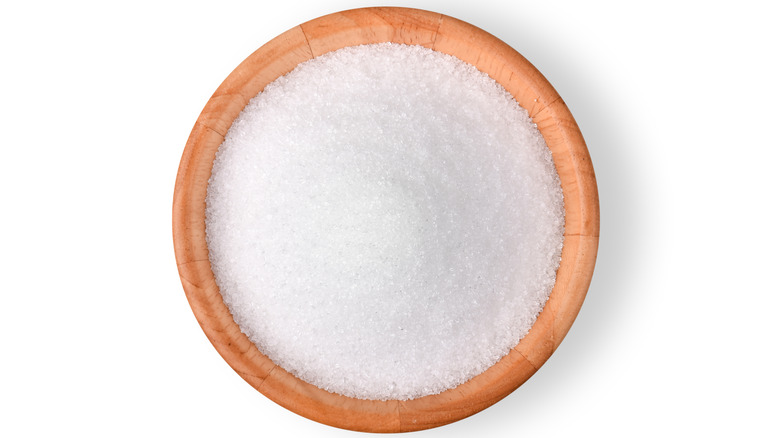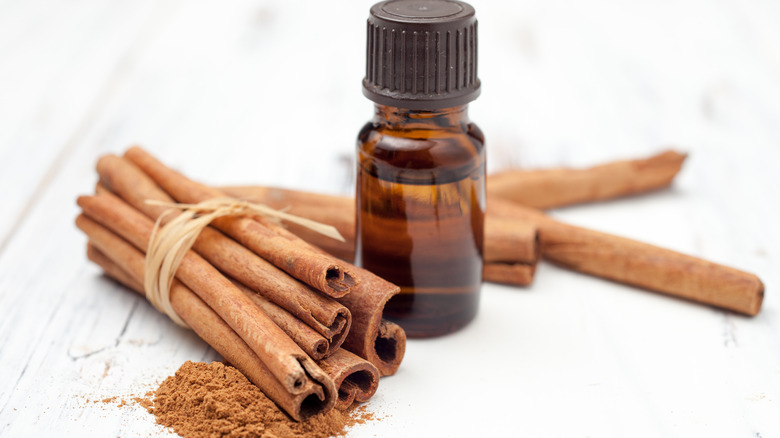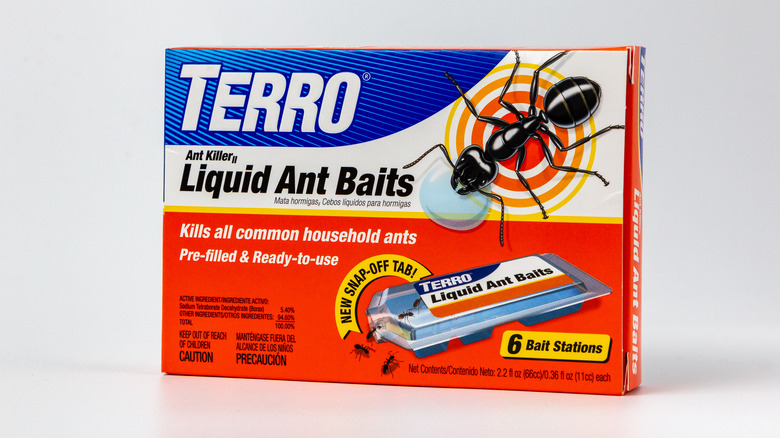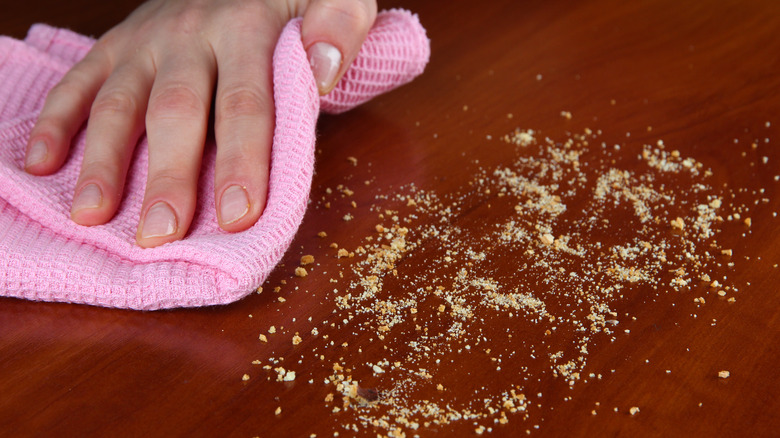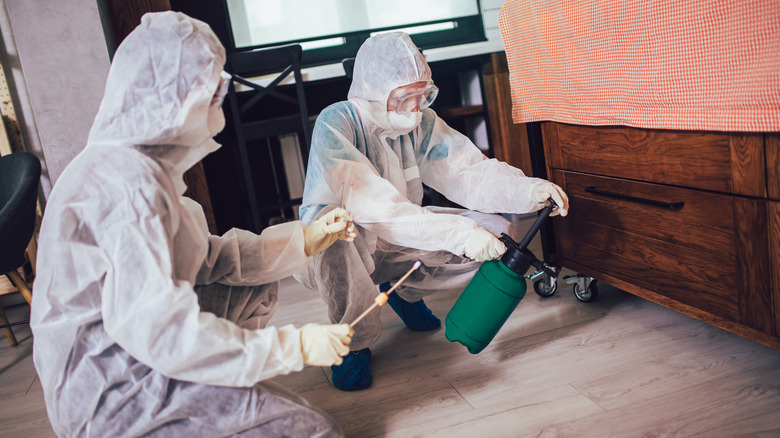8 Best Ways To Get Rid Of Ants
Ants are amazing creatures, and they are important to the ecosystem. They aerate the soil, which allows water and other nutrients to reach plant roots. They are also decomposers, eating things that other animals and pests won't. They even kill other pests, according to The Old Farmer's Almanac – but that's outside.
Ants become problematic when they make their way into our homes, because once they find a way in, they are difficult to remove. The upside is that while ants can be pesky, they pose no real danger as far as bringing disease into your house (via Consumer Reports). It may be difficult to get rid of ants, but it's not impossible. If you do have a problem with ants, don't despair — with patience and persistence, you can get rid of them. In fact, there are several ways you can try to run the pests out of your home, and many of them are safe.
1. Vinegar and water solution
If you are looking for a nontoxic way to get rid of ants, white vinegar is an easy option. The Spruce recommends a mixture of one part vinegar to one part water to eradicate the tiny pests. Just like everyone else, ants do not like the smell of vinegar. The odor also does a terrific job of covering up their scent trails, which confuses their sense of direction. Simply spray areas where you have seen ants traveling. The only downside to a vinegar solution is that you may need to reapply it a couple of times a day to keep the vinegar smell strong.
It is worth noting that vinegar is not safe for all surfaces. You should not use vinegar on any kind of stone countertop such as marble, quartz, or granite because the acid in it wears away the surface of the stone that protects it from spills and stains, says Apartment Therapy.
2. Citrus fruits
Another chemical-free way to eliminate ants is using citrus fruits like lemons, oranges, limes, and grapefruit. Instead of throwing away rinds, recycle them with this simple recipe. For this mixture, place the peels in a pot and fill the pot with just enough vinegar cover them. Heat the mixture on the stove until you see steam rising. Allow the rinds to steep several hours (overnight, if possible) and strain the liquid into a spray bottle. After that, you are ready to spray the liquid anywhere you have seen ants gathering, as noted by Kitchn.
This method works the same way vinegar does; it covers the scent ants leave behind, confusing them. Apparently, soaking the rinds with in vinegar is much more effective than by simply using the rinds alone. But another reason this technique works so well is because the oil in citrus fruits, known as d-limonene, is toxic to the critters, which makes this technique a double whammy for them. However, just like vinegar, citrus juice can wear away the protective coating on stone surfaces, so avoid spraying it on granite, marble, and quartz countertops, per Apartment Therapy.
3. Borax and sugar
Borax is a white powder that is used for cleaning, and you can even find it in cosmetics and paints, explains Web MD. It is also successful as a pesticide — in fact, borax is the main ingredient used in many store-bought ant traps.
Borax is effective, but it might take some time to see results because it does not kill ants instantaneously. The idea is to mix borax with some kind of food that ants enjoy, such as sugar. Put the mixture in a small bowl or container, and place it where you see ants. They ingest the mixture and the borax agitates their digestive system, ultimately killing them.
This approach is effective because all of the ants in the colony follow the scent trail to the sweetened mixture and ingest it. However, borax is not only harmful to ants, it is also dangerous for humans and pets if enough of it is ingested. So, do not use it in areas where you think your pets will eat it (via SF Gate).
4. Diatomaceous earth
Another powder that successfully gets rid of ants and other pests is diatomaceous earth. This fine, white powder is made from the silica and oxygen that is left behind from skeletal remains of animals that once lived in oceans, rivers, and streams. Interestingly, it makes up 26% of the earth's crust. Silica is harmful to many insects because once it touches their exoskeleton, it dries it out, killing them, according to the National Pesticide Information Center.
For this powder to work its magic, simply sprinkle food-grade diatomaceous earth along pathways that the ants are using, suggests This Old House. You can even dust the powder on plants and others areas outside your home where you see ants. While diatomaceous earth is deadly to insects, it is not considered harmful to humans or pets. That being said, you should not inhale it or get it in your eyes as it could cause some irritation, per Hunker.
5. Cinnamon
You might not think of cinnamon as a pest repellant, but it is another chemical-free alternative for driving ants out of your home. Most insects are not fond of the smell or the texture of it, according to Best Life. The spice contains an oil called eugenol, which is actually used in some insect repellants. You can sprinkle cinnamon powder in areas where you see ants crawling, but if you want to use something with a higher concentration, try cinnamon sticks. In addition, you can also use a few drops of cinnamon oil in places where you see ants.
While cinnamon will keep ants at bay, it is not recommended for long-term use because ants will simply avoid the areas with cinnamon and make new trails inside your home. Not to mention, putting cinnamon everywhere might not be the most constructive way to eliminate pests. However, it can help you get rid of the pests while you find a long-term solution.
6. Ant bait
Ant bait can be a successful way to get rid of ants, but it may take some time to see any results. Much like a borax and sugar mixture, the ants ingest a poisonous bait, which ultimately kills them. Ingredients used in ant bait include borax, avermectin, fipronil, and hydramethylnon, as noted by Terro. Some pesticides used in ant bait cause paralysis while others destroy ants on a cellular level.
Many people see ant baits as safe alternatives because they do not release pesticides into the air inside your home. If you have small children or pets, baits are relatively safe to use as long as you place them in areas where they are hard to reach. Of course, accidents can happen. Touching the bait may result in a rash, and if the bait is ingested, it could cause nausea, vomiting, diarrhea, and stomach pain. Always read the label and follow directions when using baits.
7. Rid your house of any appeal
In order for any kind of pest control to be effective, you must remove what is attracting the ants in the first place. Ants are drawn to just about anything they can eat — especially sweet foods like honey and sugar. You might keep a clean kitchen, but any amount of residue or crumbs can work against you. Be diligent and clean your countertops and appliances frequently, and don't leave any dirty dishes in your sink. In addition, keep foods in airtight bowls or bags, per Consumer Reports.
A lot of ant activity takes place in areas where you might not be able to see it. Take a look around your home and remove any wet spots or rotted wood you see. Ants are drawn to damp places, and they can build tunnels in rotten wood. If there is a leak under the sink or washing machine, they might try to colonize there. Don't just look inside your house — check the outside for damp areas under decks, windows, and door frames. Replace any rotted wood to block points of entry.
8. Call a professional
If you are not having the best of luck with any of the above methods, or you have some luck, but the ants keep returning, you may want to consider bringing in a professional. Director of education and training for the National Pest Management Association, Dr. Michael Bentley, told Today that if you see a few ants, there are plenty more that are hiding, adding that a few ants "can breed very quickly, meaning that a small ant problem can quickly turn into a major infestation if not addressed."
A visit from a professional will generally yield positive results in around seven to 10 days, but some breeds of ants are tough and may return. Bentley said that ants are one of the toughest pests to eliminate, and a colony can consist of over 1,000 ants. Sometimes, a professional might need to make several visits to eliminate them.
